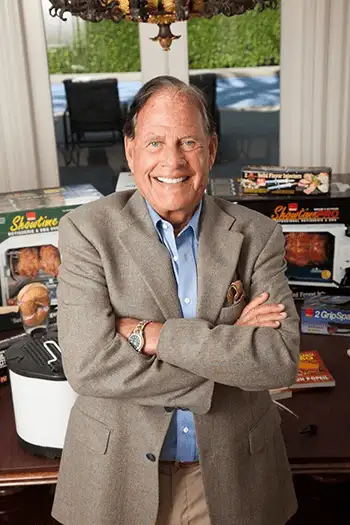Ron Popeil

Source ronpopeil.com
Remember the famous infomercials that promised to make our lives easier and better?
One name that instantly comes to mind is Ron Popeil. The legendary pitchman who brought us the Veg-O-Matic, Pocket Fisherman, and many other products passed away on July 28, 2021, at the age of 86. Popeil’s legacy as an inventor and marketer has left an indelible mark on American culture. In this article, we pay tribute to Ron Popeil and his contributions to the world of advertising and product development.
The Early Years of Ron Popeil
Ron Popeil was born on May 3, 1935, in New York City. His father, Samuel Popeil, was an inventor who owned a small kitchenware company. Popeil’s childhood was spent working in his father’s store and learning about product development and marketing. In 1959, Popeil started his own company, Ronco, with his brother, Joel. Ron started his career simply as a store pitchman or salesman for Woolworth’s stores. But even before that he had tried to sell direct to consumers at a market near his his home. From his autobiography he wrote about going to the local market and watching men sell goods from small stands direct to customers. “The first time I went there, the proverbial light bulb went on over my head,” he wrote in his autobiography. “I saw all these people selling product, pocketing money, making sales, and my mind went racing. I can do what they’re doing, I thought. But I can do it better than they can.” Ron did do better and went on to be a salesman we liked and trusted to come into our homes via our TV screens.
Ronco and the Rise of Infomercials
Ronco became a pioneer in direct-response television advertising, also known as infomercials. Ron Popeil was a master at creating catchy slogans and demonstrating products in a way that made them irresistible to consumers. His signature phrase, “But wait, there’s more!” became a cultural catchphrase. Ronco’s products, which included the Ronco Showtime Rotisserie and BBQ, the Popeil Pasta Maker, and the Bedazzler, became household names.
The infomercial industry is a type of television advertising that promotes products and services through a long-format commercial. Here are some major facts about the infomercial industry:
- History: The infomercial industry dates back to the 1950s, but it wasn’t until the 1980s that it became a popular advertising medium in the United States.
- Length: Infomercials typically run between 30 minutes to an hour, and they are designed to provide in-depth information about a product or service.
- Products: Infomercials promote a wide range of products and services, including health and beauty products, fitness equipment, kitchen appliances, and financial services.
- Scripting: Infomercials are often scripted and heavily edited to create a compelling and persuasive message.
- Cost: Producing an infomercial can be expensive, with costs ranging from thousands to millions of dollars.
- Success: Infomercials have been successful for some products, with some companies generating billions of dollars in sales.
- Regulation: Infomercials are regulated by the Federal Trade Commission (FTC) to ensure that they do not contain false or misleading information.
- Viewership: Infomercials are typically aired during off-peak hours, such as late at night or early in the morning when fewer people are watching television.
- Response: Infomercials often include a call-to-action, such as an 800-number or website, to encourage viewers to make a purchase or request more information.
- Evolution: The infomercial industry has evolved with the advent of online advertising and social media, but infomercials continue to be a popular advertising medium for some products and services.
Ron Popeil’s Approach to Product Development
Ron Popeil was a true inventor and tinkerer. He was always looking for ways to make life easier and more convenient for consumers. His approach to product development was to identify a problem that people faced, and then create a product that solved that problem. For example, he noticed that people struggled to cut vegetables quickly and efficiently, so he invented the Veg-O-Matic. He also saw that people had trouble making pasta from scratch, so he created the Popeil Pasta Maker.
The Legacy of Ron Popeil
Ron Popeil’s legacy is that of a visionary marketer and inventor who brought us products that we didn’t even know we needed. His infomercials and catchy slogans are a part of American culture, and his products continue to be sold today. Popeil’s approach to product development and marketing has inspired countless entrepreneurs and inventors.
We are fans of Ron
Ron Popeil will always be remembered as a legendary pitchman and inventor. His contributions to the world of advertising and product development are immeasurable, and his legacy will live on through the products he created and the innovations he inspired. Ron Popeil showed us that with a little creativity and persistence, we can make our lives easier and better. His approach to problem-solving and marketing is a lesson for us all.

